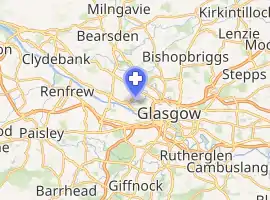Western Infirmary
The Western Infirmary was a teaching hospital situated in the West End of Glasgow, Scotland. It was managed by NHS Greater Glasgow and Clyde.
| Western Infirmary | |
|---|---|
| NHS Greater Glasgow and Clyde | |
 Western Infirmary | |

| |
 Shown in Glasgow | |
| Geography | |
| Location | Dumbarton Road, Glasgow, Scotland |
| Coordinates | 55°52′15.56″N 4°17′44.74″W |
| Organisation | |
| Care system | NHS |
| Type | Teaching |
| Affiliated university | University of Glasgow |
| Services | |
| Emergency department | Yes |
| History | |
| Opened | 1874 |
| Closed | 2015 |
| Links | |
| Lists | Hospitals in Scotland |
History
After the University of Glasgow moved from the city centre to the West End in the 1870s, distancing itself from the Royal Infirmary, a new teaching hospital was commissioned for the new university site and opened in 1874.[1] The Western Infirmary opened as a voluntary hospital relying upon donations and bequests from members of the public.[2] By 1890 there had already been 877 operations performed in the hospital.[3]
Although the hospital initially had only 150 beds, by 1911 this had increased to over six hundred. In 1936 the decision was taken to establish a medical department. In 1930 a radiology department opened[4] and, in 1936, a new ophthalmology department was officially opened, named the Tennent Memorial, with an entrance on Church Street.[5] In 1938 the research capacity increased with the opening of the Gardiner Institute of Medicine. Taking its name from the family that had gifted almost £25,000 towards its foundation the institute worked in conjunction with the University of Glasgow.[6][7]
In 1948 with the introduction of the National Health Service the Western Infirmary came under the management of the Glasgow Western Hospitals Board of Management.[8]
A £3.5 million two-phase rebuilding programme was authorised by the Glasgow Corporation in June 1962.[9] The 256–bed Phase 1 block was completed in 1974. After the completion of the nearby Gartnavel General Hospital in 1972, Phase 2 was indefinitely postponed in 1975.[1]
In 2002, NHS Greater Glasgow & Clyde announced the results of a three-year consultation, the Greater Glasgow's Acute Services Review, wherein they outlined a £700 million modernisation plan for Glasgow's hospitals. As part of the plan, some services would be transferred to expanded facilities at Gartnavel General Hospital but most of them would be transferred to new facilities at the Queen Elizabeth University Hospital site. By 2010 the Western Infirmary had only 493 inpatient beds.[10]
In Autumn 2015, the Western Infirmary closed with the exception of the minor injuries unit.[11][12] At the end of 2015 the Minor Injuries Unit moved a short distance to the Yorkhill Hospital site and the Western Infirmary closed completely on 6 December 2015.[13]
In accordance with a commitment given by the hospital to the University in 1878 that the site would be offered back to the University if it was no longer required for healthcare,[14] the University exercised its right to require the site and plans to redevelop it were approved in February 2017.[15]
Services
There was a Maggie's centre at the hospital to help cancer patients, as well as the Glasgow Clinical Research Facility.[16]
References
- Alistair Tough (23 July 1998). "Records of Western Infirmary, hospital, Glasgow, Scotland". Greater Glasgow NHS Board Archive. Archived from the original on 8 December 2006. Retrieved 28 November 2006.
- "Western Infirmary of Glasgow Advertisement". Post Office Glasgow directory. Archived from the original on 9 December 2006. Retrieved 4 December 2006.
- "Memories: Victoria and Western Infirmaries and their closures". Evening Times. 6 May 2015. Archived from the original on 3 October 2015. Retrieved 2 October 2015.
- "Glasgow Radium Centre. Opening of Radiological Department". The Glasgow Herald. 20 October 1930. p. 9. Archived from the original on 26 December 2020. Retrieved 20 February 2018.
- "Glasgow Western Infirmary: New Department to be opened. The Tennent Memorial". The Glasgow Herald. 2 April 1936. p. 13. Archived from the original on 26 December 2020. Retrieved 24 August 2016.
- "Buildings: Gardiner Institute of Medicine". University of Glasgow. Archived from the original on 3 October 2015. Retrieved 2 October 2015.
- "Research in Medicine. New facilities in Glasgow. Gardiner Institute opened". The Glasgow Herald. 29 September 1938. p. 3. Archived from the original on 26 December 2020. Retrieved 24 August 2016.
- Tough, Alistair (23 July 1998). "Records of Glasgow Western (and Gartnavel) Hospitals Board of Management, administrative body, Glasgow, Scotland". Greater Glasgow NHS Board Archive. Archived from the original on 12 October 2006. Retrieved 4 December 2006.
- "Western Infirmary Changes". The Glasgow Herald. 15 June 1962. p. 20. Archived from the original on 26 December 2020. Retrieved 27 December 2016.
- "NHSGGC Job Description". NHS Greater Glasgow and Clyde. 2009. Retrieved 24 June 2010.
- "Shake-up of city hospitals approved". BBC News. 29 January 2002. Archived from the original on 11 March 2007. Retrieved 28 November 2006.
- Thomson, Gordon (6 March 2008). "Vow to keep antenatal care in the West End". Evening Times. Archived from the original on 10 March 2008. Retrieved 6 March 2008.
- "Patients & Visitors: Hospital Closures and the new South Glasgow Hospitals: Western Infirmary Closure / West Glasgow Ambulatory Care Hospital". NHS Greater Glasgow and Clyde. Archived from the original on 17 April 2016. Retrieved 24 May 2016.
- "Glasgow University to expand main Gilmorehill campus". BBC News. 19 February 2013. Archived from the original on 22 May 2013. Retrieved 30 May 2014.
- Harrison, Jody (16 February 2017). "Glasgow University given green light to build on Western Infirmary site". The Herald. Archived from the original on 10 April 2017. Retrieved 10 April 2017.
- "The Glasgow Clinical Research Facility". NHS Greater Glasgow and Clyde. Archived from the original on 15 October 2016. Retrieved 20 January 2019.
External links
| Wikimedia Commons has media related to Western Infirmary. |
- Celebrating a Proud History: The Western Infirmary 1874−2015 on the NHS Greater Glasgow and Clyde website